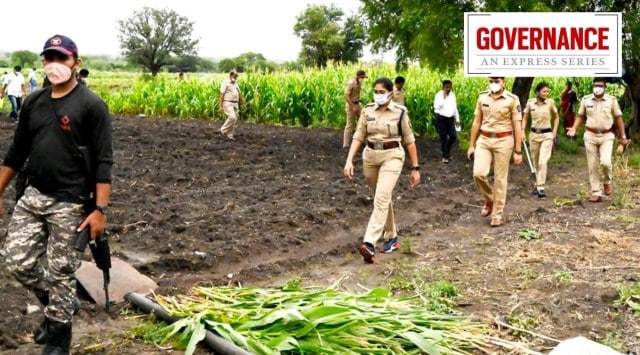How an IPS officer used soft policing to crack down on illegal hooch distilleries in Solapur
By the time Satpute joined as SP Solapur, the region had acquired a reputation as the primary supplier of hooch to at least nine districts in the state.
 In September 2021, Tejaswi Satpute launched ‘Operation Parivartan’, a four-point action plan to crack down on hooch.
In September 2021, Tejaswi Satpute launched ‘Operation Parivartan’, a four-point action plan to crack down on hooch.When Tejaswi Satpute, a 2012-batch IPS officer was posted in Solapur (Rural) as Superintendent of Police in October 2020, she knew exactly where to start. Seven years earlier, as a young IPS probationer, she had spent over two weeks in the area, during which she had identified its darkest spot: illicit liquor.
By the time Satpute joined as SP Solapur, the region had acquired a reputation as the primary supplier of hooch to at least nine districts in the state, including Beed, Osmanabad, and others along the Maharashtra-Karnataka border.
While she spent the first few months of her posting figuring out the extent to which the illicit business had spread, in September 2021, Satpute launched ‘Operation Parivartan’, a four-point action plan that combined soft policing methods such as counselling with a concerted crackdown on the haath bhattis or the hand-operated illicit liquor distilleries in the police district.
A year later, nearly 80 per cent of the haath-bhattis in Solapur (Rural) have shut down and over 650 families involved in the trade have been rehabilitated. On September 2, Satpute was awarded the FICCI (Federation of Indian Chambers of Commerce & Industry) Smart Policing Special Jury Award for Operation Parivartan.
Satpute, who has in the past been SP Satara and Pune DCP (Traffic), said that after taking over in Solapur, she zeroed in on 200 hooch black spots — 70 where hooch was manufactured and over 120 spots where it was sold. She realised that the 70 spots had turned into no-go areas for police teams, who would often be attacked by local villagers involved in the manufacture of hooch, mostly members of the Banjara community.
“It would take a team of at least 150-200 officers to conduct a raid. Hence, these raids were carried out once every few months. That didn’t help much since a day’s loss in, say, 90 days did not impact the manufacturers and they went on with their business,” Satpute told The Indian Express.
She knew frequent raids were the answer but these had to be done scientifically. A deep-dive into the production process of hooch revealed that it involved a 72-hour cycle. “Hence, we decided that there should be raids every three days to hit their production cycle. I knew it would be difficult to do so in the face of resistance from villagers. But I told my staff that we would have to do it only for the next few months. It would be enough to bring them to the negotiation table,” Satpute added.
The raids thus began in September last year and that led the IPS officer to the next part of her strategy – counselling. Satpute had realised that several families in Solapur depended on the business of hooch, and unless they had a viable alternative, they wouldn’t let go of their source of income. According to Satpute, on an average, villagers made at least Rs 5,000 per bhatti per day, with most people owning at least two to three bhattis.
Initially, the counselling sessions that Satpute and her teams held would mostly see women, senior citizens and children in attendance, with the men staying away. “The women told us that since they belonged to the Banjara community, that had been notified as ‘criminal tribes’ by the British, which stigmatised them, making it difficult for their men and youngsters to get jobs. They said their ancestors had been involved in haath bhatti and that they didn’t know any other trade. I told them that the Banjara community has a rich heritage and their ancestors were businessmen before the British notified them. The asmita (respect) aspect struck a chord with them,” the IPS officer said, adding that police had to often intervene when villagers came to them with complaints of being rejected for jobs or bank loans.
Since most families did not have valid paperwork or basic identification papers, police stood guarantor for bank loans. “In some cases, even families who owned land would use it for manufacturing hooch as it was profitable. Now that the business was not profitable, some went back to farming. For those who had skills such as repairing cars or making sweets, we helped them with small loans,” Satpute said.
Police also started Parivartan Udyog, as part of which for nearly 45 days, women were trained to operate sewing machines. “Later, we co-ordinated with various firms that gave them orders for sewing shirts. Later, schools came forward to place orders for uniforms,” she said.
Satpute says she has been rewarded with positive feedback not just from her superiors — all districts that face hooch problems have been told to follow the Solapur model — but from local villagers too.
“A woman who married into a family in Solapur did not know her in-laws brewed hooch. She often fought with them about it. When they finally had to give up hooch-making after facing police action, this young woman came to thank us. That for me was really satisfying,” said Satpute.



- 011 day ago
- 021 day ago
- 0318 hours ago
- 041 day ago
- 051 day ago




























